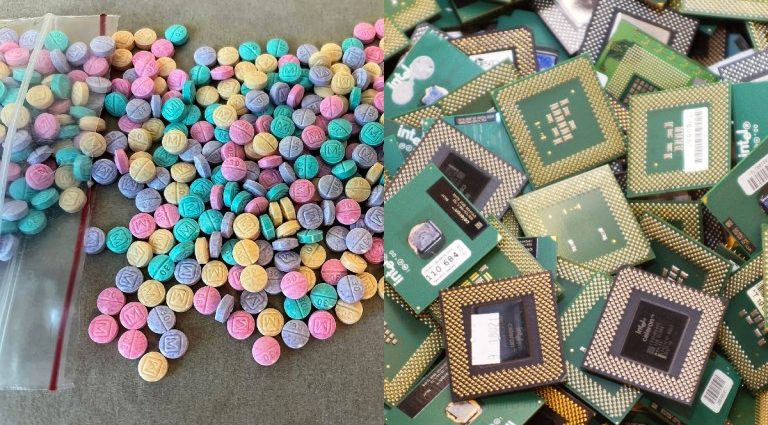
Political tensions between Beijing and Washington have increased again after the Biden administration sanctioned 12 Chinese firms for shipments to Russia and two others for supplying chemicals illicitly used in Mexico to produce the opioid drug fentanyl for the US market.
The US Department of Commerce’s Bureau of Industry and Security (BIS) last week amended the Export Administration Regulations (EAR) by adding 12 Chinese firms and 10 Russian ones to its Entity List. The amendment was published by the US’s Federal Register on Monday.
Electronic products allegedly shipped to Russia were described as having been consumed by “military end-users” in Russia and Belarus.
Elaborating on those charges, Japan’s Nikkei newspaper reported that some small traders in Hong Kong and mainland China shipped chips of Intel, Advanced Micro Devices and Texas Instruments to Russia in 2,358 transactions between February 24 and December 31 last year.
For the period, the exports of US semiconductors from Hong Kong and China to Russia rose to US$570 million, more than 10 fold of US$51 million recorded in the same period in 2021. These products include microprocessors, as well as field programmable gate arrays (FPGAs), which are a type of rewritable and programmable integrated circuit that can be used in missiles.
Sanctioned electronics export firms
The sanctioned Chinese firms have allegedly continued to procure or attempt to procure items on behalf of Russian entities that have been sanctioned since Russia’s invasion of Ukraine in February 2022, said the BIS.
Several firms are registered in Hong Kong but based in Shenzhen.
For example, 3HC Semiconductors (HK) Co Ltd has an office in Mongkok, Hong Kong, but on the mainland it is called Shenzhen Sanhe Technology Co Ltd or Sanhe Semiconductor.
According to its LinkedIn account, 3HC’s main products include integrated circuits, capacitors, discrete devices, memory chips and passive components. It says it cooperates with global brands including Microsemi Corp, Actel Corp, Vishay Intertechnology and Texas Instruments.
Allparts Trading Co Ltd was set up in Hong Kong on July 4 last year. It has offices in Hong Kong and Shenzhen and a factory in Guangzhou.
ETC Electronics Ltd says in its website that it supplies electronic components, including integrated circuits, capacitors, resistors and switches. It is based in Shenzhen with a warehouse centre in Hong Kong.
Leadway Technology Ltd, also called Shenzhen United Leadway Technology Co Ltd, sells USB flash drives, wireless chargers, power banks and memory cards.
Xinnlinx Electronics Pte Ltd says in its website that it serves the aerospace and defense industry with commercial, defense and space grade system-level solutions that span FPGA and system-on-chip (SoC) devices.
Wynn Electronics Co Ltd, a chip distributor, has a motto of “providing customers with high quality and low price products,” according to Baidu.
China’s Ministry of Commerce in a statement on Saturday criticized the US for cracking down on the 12 Chinese firms involved in shipments to Russia.
“The US’s latest action is a typical unilateral sanction” and the exercise of “a long-arm jurisdiction that has no basis in international law and is not authorized by the United Nations Security Council,” said the ministry. “It seriously damages the legitimate rights and interests of enterprises and affects the security and stability of the global supply chain.”
“The US should immediately correct its wrongdoings and stop its unreasonable suppression of Chinese companies,” it said.
Fentanyl: the Chinese connection
On the drug front last week, the US Department of the Treasury’s Office of Foreign Assets Control (OFAC) sanctioned two Chinese entities and five individuals, based in China and Guatemala, for supplying precursor chemicals to drug cartels in Mexico for the production of illicit fentanyl intended for US markets.
As an analgesic, fentanyl is about 50 times more potent than heroin and 100 times more potent than morphine. More than 71,000 people died in the US in 2021 due to overdoses of the drug.
“The so-called fentanyl precursors in the US are common chemicals. In international trade, it is the importer’s responsibility to prevent common chemicals from flowing into drug-making channels,” Wang Wenbin, a spokesperson of the Chinese foreign ministry, said Monday.
“The root cause of the drug problems in the United States lies in the United States itself,” Wang said. “The US only accounts for 5% of the global population but consumes 80% of the world’s opioids. Until now, it has not yet strictly regulated fentanyl.”
“If the US sincerely wants to solve the domestic drug problem, it should respect the facts, reflect on itself, correct its mistakes and stop shifting the blame,” he added.
View from the commentariat
Some Chinese columnists connected the latest rounds of sanctions to Secretary of State Antony Blinken’s failure to visit China as previously planned.
“Blinken threatened to sanction China while saying that he wanted to visit China,” a Shaanxi-based columnist says in an article. “Obviously, the US lacks the sincerity to mend Sino-US relations.”
He says China will not receive US officials if the US government does not take actions to improve the two countries’ relations.
Last Saturday, Blinken met Vietnamese Prime Minister Pham Minh Chinh in Hanoi. Both sides agreed to boost the bilateral relations between the US and Vietnam.
Read: Beijing complains of new ‘illegal’ US sanctions
Follow Jeff Pao on Twitter at @jeffpao3

